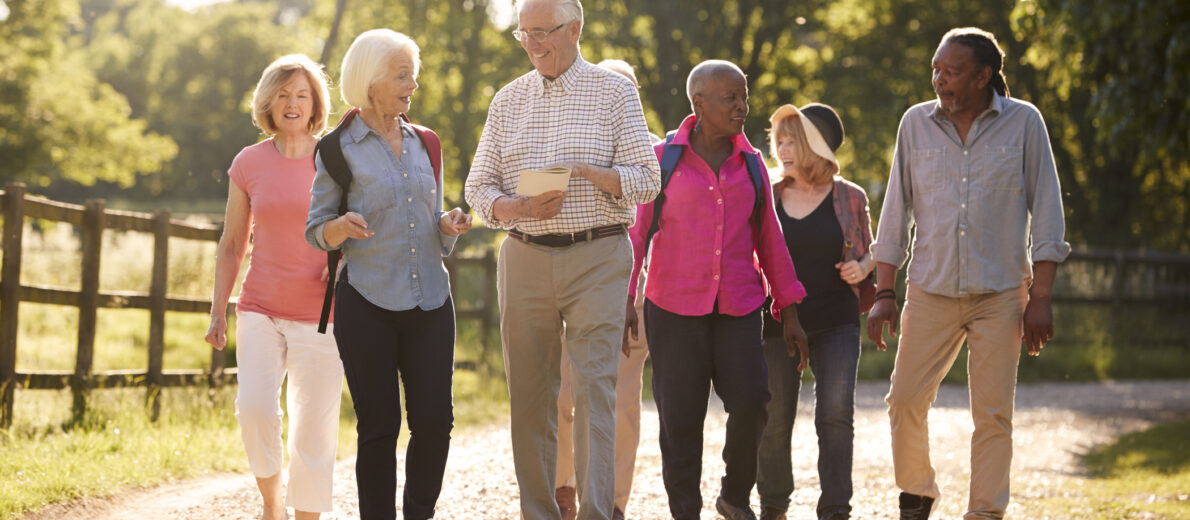Surprising Health Benefits of Friendship and Senior Living

Quality time spent with a friend is one of life’s most precious gifts. Those voluntary and meaningful connections, often marked by laughter, trust and acceptance, can really light up the day, adding a warm spark to our lives. Considered one of the leading contributors to happiness, friendship, to many, is worth its weight in gold. Unsurprisingly, scientific research backs this sentiment: studies show that friendships are not only good for the spirit but also beneficial to our physical and mental well-being.
Friendship, as it turns out, improves everyone’s quality of life in dramatic ways. Modern studies have proven that interactions with friends who maintain a healthy mindset makes someone five times more likely to prioritize and support their own health. What this tells us is that the people we surround ourselves with have a profound impact on our health, well-being and overall life experience.
The Evolution of Friendship over Time
As we proceed through the various stages of life our friendships tend to change, often gaining more importance as we get older. In many cases friendships will become equally or even more important than familial relationships. A series of studies conducted at the Michigan State University monitored 280,000 participants in over 100 countries to conclude that friendship is a stronger predictor of health and happiness than even family relationships.
The assistant professor and author behind the studies, William Chopik, has made a career out of studying the effects of friendship on both mental and physical well-being. He notes that as we evolve throughout life, so will our friendships. “As we age, we prune away at some of the friendships that are more superficial and acquaintance-like” says Chopik, leaving us “with the ones that are deeper and make us happy.” Through his and others observations it’s easy to see that friendship provides both cognitive and physical health benefits, especially notable in the senior population.
The Cognitive Results to Friendship
Loneliness and isolation compound a number of concerning health issues while friendship and bonding showcase some quantifiable upsides. The Journal of Neurology, Neurosurgery & Psychology published a study correlating loneliness with the onset of dementia, noting the risk of dementia increased by more than 60% for those who qualified as lonely.
Research also shows loneliness to be more damaging to the body than obesity, drinking or pollution. Those with healthy friendships and active social outlets tend to process and move through stress and grief faster, allowing them to stay engaged and full of vitality.
Era Living has long known this and implements a number of strategies to create a thriving and connected environment for its residents. As the only senior living center in Seattle certified in the The Best Friends™ Approach, Era Living supports those with dementia through positive advocacy that builds residents self-esteem and resilience through active connection and interaction.
Understanding that friends have the unique ability to reflect our goodness back to us, caregivers can respond accordingly to highlight our intrinsic value should we ever be feeling blue. You can read more about the Best Friends Approach in our previous blog post.
Physical and Mental Health Benefits
But the upsides of friendship aren’t just cognitive, they’re physical as well. The World Health Organization noted that people who live alone often have a higher risk of chronic illnesses including lung disease, depression and arthritis, while studies through the National Institutes of Health revealed that lonely people are 29% more likely to develop heart disease and 32% more probable to suffer a stroke.
Through these findings we learn that strong social support and close friendships lower the risk of obesity, heart disease and high-blood pressure. Those with social support typically live longer and healthier lives, drawing strength and resilience from their social bonds.
How to Make & Maintain Friendships
Friendships exist along a range of intimacy. It’s important to have all kinds of friendships, both casual and close. In some cases people we meet will stay as friendly acquaintances in our lives while others might become our best friends. There’s not always a rhyme or a reason as to why. Spending time with a variety of connections helps keep life dynamic and interesting- plus it’s fun to have someone to join us for bingo, a walk in the park, or ice cream.
Making new friends later in life can seem like a daunting task but there are many ways to approach it. One easy way is to join a club or group planned around an activity you love or have interest in. It will be easier to connect with strangers and new acquaintances when there is a shared interest or hobby to bond over and enjoy together.
Era Living appreciates the richness of friendship and knows these connections add depth to the tapestry of our lives. Our communities create opportunities and experience for these connections to thrive and seniors tend to experience notable benefits while living in an Era Living community. Organized activities and clubs within the residential communities provide plentiful options for meeting new people and socializing.
Related Posts

Podcast: Era Living’s In-House Director of Capital Projects

Podcast: A Day in the Life at Era Living: Resident Jeanne Luchtel

